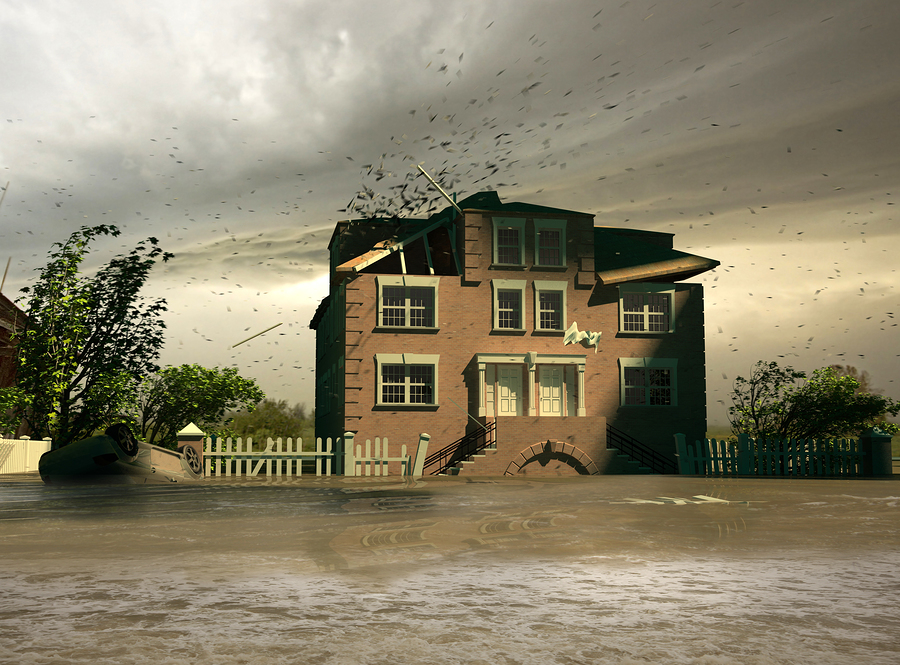
Hurricanes are one of the most devastating acts of nature. They cause extensive damage to property and threaten lives. Since a whopping 40% of all hurricanes in the United States hit Florida, learning about insurance coverage can save you a substantial amount of money and spare you a lot of heartache.
How much hurricane insurance do you need?
The amount of insurance you need depends mainly on whether you live in an area that is prone to floods. As a general rule, you should carry enough insurance coverage to be able to rebuild your home if you reside in a high-risk area.
Homeowners insurance generally isn’t comprehensive enough to cover all possible destruction, so you may need multiple policies or add-ons.
Dwelling Coverage
Dwelling coverage is the portion of your homeowners insurance policy that relates to the cost of rebuilding and repairing a house in the event that it is damaged or completely destroyed. A policy will outline what types of damage are covered, for example, wind, hail, lightning, or fire.
Personal Property Coverage
This portion of your homeowners insurance policy will reimburse you for losses suffered due to property destruction or burglary. By law, Florida requires property insurance to cover damages caused by wind if the storm is officially declared a hurricane.
Loss of Use Coverage
The loss of use coverage portion of your policy will cover your expenses that increase due to the damage to your property. For example, if you normally spend $400 on groceries but damage to your kitchen forces you to spend more on restaurant meals, the difference of $200 will be covered. This can also include hotel charges while your house is under repair and inhabitable as well as mileage if you have to drive a longer distance to work or any other locations in your normal routine.
Covering the Gaps in Your Home Insurance
The principal coverage that you need to get to cover the many gaps in your homeowners insurance policy are as follows.
Flood Insurance
Even if your home is not in a designated flood zone, investing in flood insurance coverage can be a wise precaution because up to 25% of flood claims come from properties outside of the high risk zones. Since the average flood damage claim is $43,000, the coverage could end up paying for itself.
Debris Removal Coverage
Debris removal coverage is the part of the policy that provides for expenses related to cleaning up and removing fallen branches, detached pieces from the house, stray objects that were blown into the property, and other materials present because of the natural disaster. As cleaning up debris can be dangerous, it is useful to have this coverage so that hiring experts is affordable.
Water Backup Coverage
The water backup coverage clause can be added onto the coverage of a homeowners insurance policy. This coverage helps pay for damages resulting from a backed up drain or a sump pump, which are more likely to happen with the overabundance of rain.
What’s a hurricane deductible?
A hurricane deductible is the amount a policyholder pays before an insurance company is required to pay for hurricane-related damages. Under Florida law, the hurricane deductible applies only once in a hurricane season. The deductible is triggered when there is a hurricane or a tropical storm.
Deductible amounts vary from policy to policy. The details of the hurricane deductible are listed in the homeowners policy declarations page.
Deductibles can be either for a specific dollar amount or for a percentage of the insured value of the house. Typically, the range is from one to five percent. All private insurers must offer $500, 2%, 5%, and 10% deductible options.
What’s a Hurricane Moratorium?
Moratoriums place limits on when policies can be purchased. Insurers could place a moratorium on issuing new policies when a hurricane is about to hit. Generally, there is a 24 to 48 hour waiting period before the moratorium goes into effect, but they can apply sooner in some circumstances. Moratoriums aren’t applied often. However, when they are issued, they can leave last-minute planners with insufficient coverage.
Preparing Your Home for a Florida Hurricane
The following steps should be taken to prepare your home for a hurricane:
- Have an emergency kit. Two of the most important FEMA-recommended resources to have are a two-week supply of food and water.
- Understand your homeowners insurance. If you need flood insurance, get it before there is a hurricane or tropical storm. Before hurricane season, check the coverage, deductible, and moratorium clauses. Make sure you have the best coverage for your specific needs.
- Check your roof for any missing shingles or tiles. Get them fixed well before hurricane season.
- Get sandbags ahead of time. Properly placed sandbags can divert significant flood water away from your home and reduce flood damage.
- Clean your gutters. Clean gutters are more effective in diverting water away from your home.
- Secure outdoor items, including patio furniture and potted plants, inside the house.
- Prepare for power outages. Make sure you have a sufficient battery supply to operate flashlights and a cell phone. If you are using a generator, carefully follow the safety guide that comes with it.
- Add storm shutters to your windows. They can be expensive and time-consuming to install, but are often worth the time, effort, and money. Many insurance companies even offer lower premiums to homeowners with impact-resistant windows.
- Have an evacuation plan that outlines multiple routes to reach your evacuation destination.
If your insurance claim for hurricane damage was underpaid or denied, contact The Eberst Law Firm to discuss your case. Our experienced legal team can advocate on your behalf to get the insurance compensation you need for your home and property. Call us at 772-225-4900 or contact us online today.
About the Author of this Page: The above information was written or reviewed by one of the attorneys at The Eberst Law Firm who have extensive experience trying legal cases outside and inside courtrooms throughout Florida. This article was also extensively researched to ensure that all information is accurate and up to date. If you want to know more about the author of this page, view our our attorney bios here.
